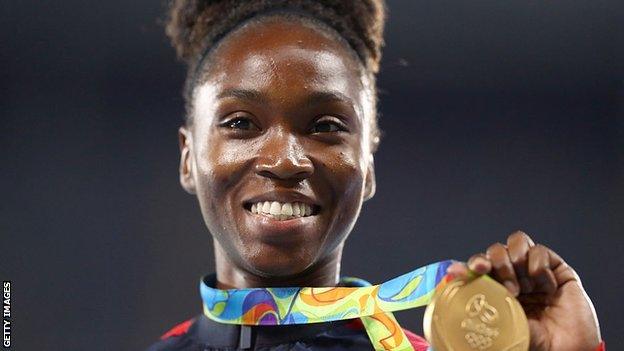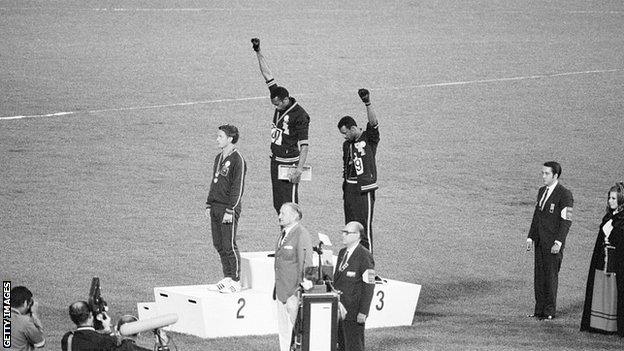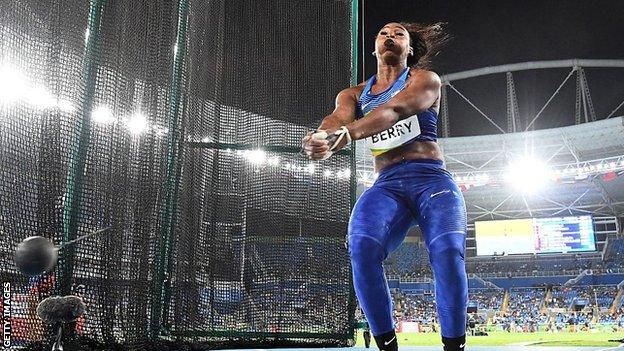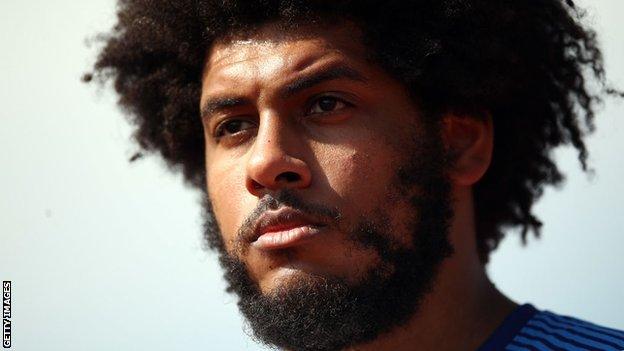Olympic protest ban: 'My community made me, not my country, not the flag, not the IOC'
- Published
Bartoletta and Berry speak out against ban on protests
Since the death of George Floyd in May 2020, athletes around the world have been using their sports as stages to protest against racial injustice.
But on 22 April 2021 - a day after former police officer Derek Chauvin was found guilty of murdering George Floyd in Minneapolis - the International Olympic Committee announced it was upholding 'Rule 50' of the Olympic charter, which bans acts of protest at the Games.
The IOC says the rule, external "strives to ensure that the focus at the Olympic Games remains on athletes' performances, sport, unity and universality" and exists to "protect the neutrality of sport".
But BBC Sport spoke to three athletes who said upholding the rule was "deplorable", "infuriating" and "hypocritical".
And with fewer than 50 days to go until the Games, competitors do not know what sanctions they might face for protesting in Tokyo.
'What is so dangerous about that message?'

Tianna Bartoletta is the reigning Olympic long jump champion
Three-time Olympic champion Tianna Bartoletta says banning protesting against racial injustice should not be a decision made by people who have not experienced it.
The American has won sprint relay gold at the past two Games, and long jump gold at Rio 2016.
She told BBC Sport: "I'm not allowed to use the platform, where I've won three gold medals, to look [kids watching] in the eye and say: 'I have been through all of those things. And I still was able to go to the training, I was still able to figure out how to believe in myself.'
"What is so dangerous about that message?"
The IOC has been under pressure to relax 'Rule 50' as anti-racism protests in sport have become the norm in the past year.
At the 1968 Games, Tommie Smith and John Carlos were suspended for raising their fists in a Black Power salute on the podium after finishing first and third respectively in the 200m.

Tommie Smith and John Carlos were suspended for raising their fists on the Olympic podium
Fifty three years on, the IOC carried out a 10-month consultation, asking 3,457 athletes in a survey whether 'Rule 50' should change.
It said more than 3,500 athletes, representing 185 different nations across all 41 sports were represented.
Of those who took part, 67% said they wanted to keep the Olympic podium free from protests, and 70% wanted to avoid on-field demonstrations.
Bartoletta says she does not know any American athletes who were questioned, and believes it was disrespectful the IOC made the announcement in the week it did.
"It just felt like it was too much at the same time," she said.
"Why are you so committed to only letting me be great in this one arena, and not caring about the process to get there? My process to get to the Olympics is not the same as maybe a white fencer. And yet they don't want to hear those stories because it could be considered 'racial propaganda'.
"That's what's inspiring about the Olympics. That's what makes it so infuriating and so hypocritical. Don't we need to see ourselves in these stories?
"There are little black girls and boys that are going through this, who think they'll never get out of their situations."
When it announced its recommendations in April, the IOC said it and the IOC athletes' commission were "fully supportive of the freedom of expression".
Kirsty Coventry, a two-time Olympic champion swimmer who chairs the athletes' commission, said: "Being an Olympian, the field of play, the ceremonies were very specific and hold very specific memories in my heart. So if I think about when I was competing I wouldn't want something to distract and take away from that.
"That's how I still feel today."
But Bartoletta and other athletes have said the language of 'Rule 50' is problematic, particularly the line that says: "No kind of demonstration or political, religious or racial propaganda is permitted in the Olympic areas."
She said: "It's a privileged position to be able to remain neutral in the face of human rights violations.
"They don't see the plight of people of colour, minorities and marginalised and oppressed populations as a global issue, which is why this is such a hard fight to have."
Global Athlete, an alliance advocating for athletes' rights, says 'Rule 50' is the "opposite to freedom of expression", external and breaches the Universal Declaration for Human Rights.
'They exploit our superpowers'
US hammer thrower Gwen Berry raised her fist in a Black Power salute after winning gold at the 2019 Pan American Games.
She was reprimanded by the US Olympic Committee, which placed her on probation, banning her from any form of protest for 12 months. She also lost sponsorship deals - in June 2020, she said, external her stance had cost her $50,000 (£35,000).
Allow X content?
This article contains content provided by X. We ask for your permission before anything is loaded, as they may be using cookies and other technologies. You may want to read X’s cookie policy, external and privacy policy, external before accepting. To view this content choose ‘accept and continue’.
"Even before slavery, black people were always put on a pedestal because of our physicality," said Berry, who competed at the Rio Olympics.
"We bring the money, we bring the entertainment, we bring the passion. So they exploit our superpowers.
"They tell us to shut up and not to talk about the very communities that made us resilient, made us strong, made us passionate. Because of the communities that built me and supported me, those are the issues that I am allowed to talk about based off basic human rights.
"The things that have happened to black people around the world are so horrible that instead of confronting it, everybody wants to hide from me."

Gwen Berry says people should remember "change is always uncomfortable, but we wouldn't be here today without constant change"
Bartoletta said being told not to speak out was nothing new.
"As long as my ancestors have been in this country, our bodies were for the consumption of others, for the powerful," she said.
"One of the first places we could experience some rights was the entertainment industry. Even though we didn't have the right to vote, as long as we were entertaining people, it was OK.
"We're still perpetuating that and it's so deeply ingrained. Get on Twitter any given day - when an athlete speaks their mind about something, you'll see countless 'oh, just shut up and play. I'm only here for the sport'. As if these people are entitled to just use you.
"That's what the Olympics is like, especially when there's no money involved. There's no real transactional benefit, and they dangle the allure of you get this medal and all the world is watching and, and maybe you'll be paraded at home. But we know what it's like at home. We live this life."
'To tell us we can't have a voice is hypocritical'

Greg Thompson says athletes' bodies "aren't political playgrounds"
Discus thrower Greg Thompson, who is fourth on the UK all-time list, says the decision to uphold the ban is unfair, but calls it "typical".
"To be told that your right to expression is only allowed in a certain paradigm, in a certain format, under certain rules and provision by people that also don't necessarily look like you do and who don't understand what you've been through, I just think it's deplorable," he told BBC Sport.
"I don't see how anyone with a conscience can expect us, as tools of physical prowess, to minimise ourselves mentally and emotionally. I just think it's a ridiculous sentiment.
"Sport has always been a device for political gain. To tell us we can't have a voice is hypocritical and contradictory."